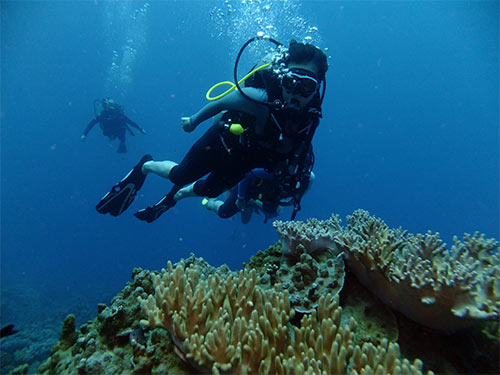Humans have been exploring the depths of the underwater world long before the invention of diving equipment. Along with the sport of scuba diving, freediving continues to gain popularity today. The big question is – why freedive when you can put on a tank and stay underwater for longer? On the contrary, why pack scuba gear when you can freely dive without?
Big
Ocean Dives explores the differences and similarities between scuba diving and
freediving, and whether one or the other is right for you.
Breathing
One of the more obvious differences between scuba diving and freediving is breathing. While scuba divers are taught never to hold their breath underwater for the risk of lung overexpansion, freedivers hold their breath through the entire duration of the dive.
Both scuba diving and freediving require the professional training of a licensed instructor to ensure safe diving and that it is done correctly. Scuba diving requires proper knowledge about safe ascent rates, no-decompression limits, and safety stops. While freedivers don’t need to worry about these factors, more awareness of breathing techniques is a must.
A
quality diving instructor is able to:
• Provide
a comfortable environment where students can learn proper technique
• Be
open to questions and remain patient with their students
• Share
the passion of diving while instilling the importance of safety techniques and
protocols
Exploration
Scuba diving allows for longer time spent underwater than freediving, lending to the ability to explore more marine life and enjoy the underwater world for longer durations. However, without the bubbles from diving gear to scare off some marine animals, freediving offers possibilities to observe aquatic life at a closer distance.
While
both scuba diving and freediving provides the chance to explore wrecks and
caves, scuba diving has the advantage of being able to stay longer underwater.
You can cover greater distances and dive deeper with less risks. With that
said, freediving allows for easier and more flexible range of movement in and
out of caves, without needing to worry about ascent techniques.
Experience
Though the key differences between scuba diving and freediving is breathing and duration underwater, one of the deeper distinctions is the experience that both presents.
With scuba, the mind is focused on what can be seen where as freediving is focused on what can be felt. Scuba diving offers levels that can be monitored for depth and time, while freediving relies on the body’s natural responses.
Scuba diving calls for mastering skills that can be enjoyed with exploring the underwater world. Freediving comes with challenging your mental and physical abilities and offers endless opportunities to improve.
Purpose
The
reason divers take interest in either scuba or freediving ultimately comes down
to their purpose. Scuba diving is done more for leisure and discovering what
the underwater world has to offer. Freediving provides a sense of
accomplishment as divers continuously aim to improve and strive for personal
bests in depth, time, and distance, which requires a sense of perseverance and
determination.
Key Takeaways
Whether you’re seeking an outwardly-focused experience with scuba diving or to go inwards with freediving, both require certain skills and techniques to master that can be taken as a life lesson.
The ability to be relaxed and stay calm helps scuba divers to avoid panic and freedivers to minimize their oxygen use. This increases your mental strength in everyday life and grows your awareness of self.
Both offer some incredible and life-changing experiences that can only be felt underwater. The best way to experience either is with the help of a professional instructor to teach you safe techniques to truly explore what the underwater world is all about.








